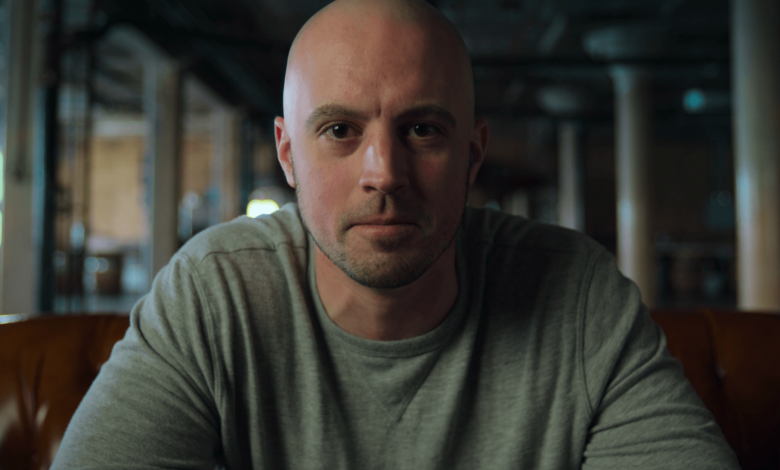In Netflix’s ‘Sign Stealer,’ Connor Stallions wants you to believe he’s a victim. He’s not.

There’s a moment about 40 minutes into “Untold: Sign Stealer,” the new Netflix documentary, where former Michigan commit Connor Stalions recounts his sudden banishment from the program last season after his elaborate scouting scheme came to light.
By this point, we’ve learned from Stalion’s own words and from videos of his family back home how singularly obsessed he was with the Wolverines — at age 7, he dressed up as Bo Schembechler for Halloween. Nearly every decision he made from that point on — including attending the Naval Academy — was made with the goal of one day coaching his favorite team. And he seemed to be on his way, earning the trust of Jim Harbaugh and his staff for his uncanny ability to read signals.
And then, almost overnight, they stopped talking to him. He was first suspended and then resigned.
“For as long as I can remember, Michigan has been a huge part of my life,” says the former Marine Corps captain. “For that to be taken away all of a sudden was pretty devastating.”
It’s a recurring theme in the film, as Stalions, giving his first interviews since the scandal broke last October, spends essentially 90 minutes giving his side of the story. Time and again, it’s clear that the man at the center of an NCAA Notice of Allegations sent to Michigan last week sees himself as a victim.
“His position is that he feels like he was targeted, and he did something that everyone else was doing,” the film’s director, Micah Brown, said in an interview on “The Audible” this week. “He just did it better.”

GALLING DEEPER
Michigan Receives Formal Notice of Allegations from NCAA
It will be interesting to see whether the public agrees with Stalion’s assessment of his plight.
The filmmakers interviewed several people close to Stalion, including his parents; a close friend from the Marine Corps; a Michigan beat writer he befriended; and Barstool founder and Wolverines fanatic Dave Portnoy. All understandably take a sympathetic tone toward the documentary’s subject.
But in perhaps the juiciest moment of the entire affair, we also see a portion of Stalion’s Zoom interview with NCAA investigators — possibly the first time in history that such a thing has been made public. What we see is a defendant, surrounded by his lawyers, repeatedly evading and/or lying in response to their key questions.
Earlier, one of the filmmakers asked Stalions for his reaction to the infamous photo of him on the sidelines of last season’s Michigan State-Central Michigan game, dressed in Chippewas gear and sporting a fake mustache. Stalions chuckles and says, “I don’t even think this guy looks like me.”
Unfortunately for Stalions, his new buddy Portnoy goes on camera and says that Stalions admitted it was him. When asked by the NCAA investigator if he was at the game, Stalions thinks about it for a few seconds and then says, “I don’t remember a specific game.” The investigator tries to ask again, at which point his attorney interjects, “He answered the question.”

NCAA investigators focused on Connor Stallions’ travels. (Netflix)
And as for buying tickets to games featuring Michigan’s future opponents and hiring others to film their sidelines? The alleged scheme at the heart of the whole case? Stalion’s central claim is that he was, in fact, an amateur ticket broker. The filmmakers show a list of 17 2021-23 games for which he bought tickets (the NCAA alleges he did so for 58 games), with a column listing the name of a person to whom he transferred them or whether he resold them on the secondary market.
“I don’t recall ever ordering anyone to go to a game,” he tells the investigator before glancing at what appears to be a written note between him and his lawyer. “As far as I know, there are people who have gone to games, using tickets that I bought, and recorded parts of those games.”
“A friend sent me some film,” he explains in a separate interview for the cameras. “It’s kind of like when your aunt gives you a Christmas present that you already have. You’re not going to be rude and say, ‘Oh, I already have this, I don’t need it.'”

GALLING DEEPER
Emails reveal termination of Connor Stalions, former Michigan employee accused of stealing signs
Of course there are already reports of people who say Stalions paid them to do just that. But that doesn’t fit his chosen story.
The credibility that Stalions still thinks he has is disappearing rapidly.
If there’s ever a time to feel sorry for Stalions, it’s when we see him sitting in the stands at NRG Stadium, laughing and crying as confetti rains down on the 2023 national champion Wolverines. You can tell that Stalions, to whom Harbaugh awarded a game ball after Michigan’s 2022 win over Iowa, sees himself as a player who played a role in the Wolverines’ title run. And maybe he did. We’ll never know.
His only tangible impact on the program, however, will be whatever NCAA sanctions Michigan receives. Stalions will almost certainly receive a show-cause order barring him from working in college football anytime soon.
But in his eyes it was all worth it.
“Connor has took the fall,” Brown said. “He never said anything that implicated anyone else. He implicated himself in every way possible.
“If you think about the soldier who fell on the grenade, that’s certainly what he did.”
(Top photo: Netflix)




